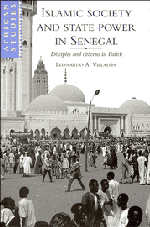Book contents
- Frontmatter
- Contents
- List of tables
- Acknowledgments
- A note on spelling
- Glossary
- Map of Senegal
- Introduction: good Africans, good citizens, good Muslims
- 1 Islam in the politics of state–society relations
- 2 The structure of society: Fatick in the Senegalese context
- 3 The state–citizen relationship: struggle over bridges
- 4 The marabout–disciple relationship I: foundations of recruiting and following
- 5 The marabout–disciple relationship II: the structures of allegiance
- 6 The state–marabout relationship: collaboration, conflict, and alternatives
- 7 Bureaucrats, marabouts, and citizen–disciples: how precarious a balance?
- Notes
- Select bibliography
- Index
- Titles in the series
1 - Islam in the politics of state–society relations
Published online by Cambridge University Press: 10 November 2009
- Frontmatter
- Contents
- List of tables
- Acknowledgments
- A note on spelling
- Glossary
- Map of Senegal
- Introduction: good Africans, good citizens, good Muslims
- 1 Islam in the politics of state–society relations
- 2 The structure of society: Fatick in the Senegalese context
- 3 The state–citizen relationship: struggle over bridges
- 4 The marabout–disciple relationship I: foundations of recruiting and following
- 5 The marabout–disciple relationship II: the structures of allegiance
- 6 The state–marabout relationship: collaboration, conflict, and alternatives
- 7 Bureaucrats, marabouts, and citizen–disciples: how precarious a balance?
- Notes
- Select bibliography
- Index
- Titles in the series
Summary
Stated most boldly, the central argument of this book is that religion has been at the source of Senegal's political exceptionalism because, in the Sufi version of Islam which has developed in the country, religious structures and ideology have facilitated and encouraged a system of social organization outside the state and a range of possible responses to the actions of that state which have served as an effective counterbalance to its weight. Islamic social structures have proven to be effective conduits for mediating the processes of state-society relations in Senegal, redressing the mismatch that has usually characterized African “state-society struggles.” The analysis presented here, therefore, draws directly on and has implications for a theoretical perspective that posits the possibility of distinguishing analytically between state and society and approaches the nature of their interaction as a phenomenon to be explained.
The argument also has implications for a theoretical understanding of the relationship between Islam and political action. The dramatic success of the 1979 revolution in Iran directed the attention of scholars, journalists, statesmen – and Muslim activists – to the potential political import of a force that many, influenced by theories of social and political “modernization,” had assumed to be receding into the domain of personal conviction. In the wake of that revolution, with its militant and explicitly Islamic fa9ade, much energy has been devoted to the analysis of Islam as a political force.
- Type
- Chapter
- Information
- Islamic Society and State Power in SenegalDisciples and Citizens in Fatick, pp. 15 - 38Publisher: Cambridge University PressPrint publication year: 1995

